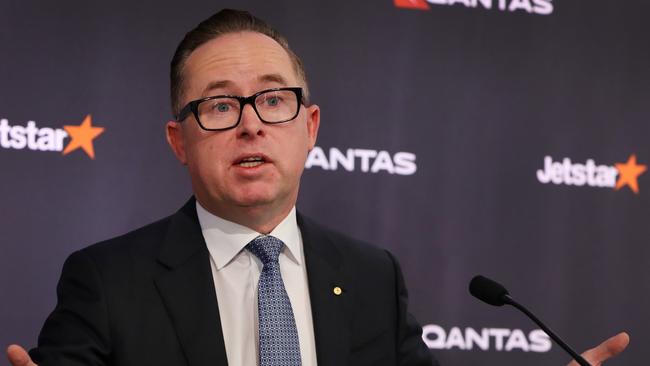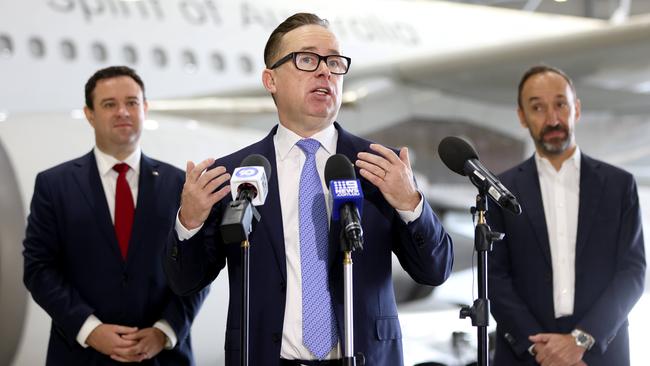Qantas boss deflects calls for resignation after trying year
Alan Joyce has shrugged off union calls for his resignation following another big loss for the airline, saying they’re ‘part of the job’.

Business
Don't miss out on the headlines from Business. Followed categories will be added to My News.
Fronting what may well be his second last full-year results announcement, Qantas Group CEO Alan Joyce appeared less upbeat than usual, as he detailed the “staggering” $1.86bn loss.
Despite a more positive outlook for 2023, Mr Joyce was not his word perfect, quick-witted self, and probably with good reason after another challenging 12 months.
After a shocking start to the 2022 financial year with Covid lockdowns in multiple states, Qantas stood up its remaining workforce only to have Omicron come along and wreak havoc throughout December and January.
Finally borders opened Australia-wide and demand boomed but airlines and airports appeared to be caught by surprise, with massive queues, flight delays and mountains of lost baggage.
After struggling through April and May, in June Mr Joyce promised Qantas and Jetstar were ready for the winter holiday period, only to run into more strife.
The rate of mishandled bags hit 11 in 1000 in July, up from 6 in 1000 pre-Covid, and almost one in two flights was delayed, and hundreds more cancelled.
The months of misery prompted demands for Mr Joyce’s resignation, predominantly from union officials, which had not gone unnoticed by the CEO who is expected to stick around until the end of 2023.
“That’s part of the job,” he shrugged.
“You recognise in this job that Qantas is so passionately loved by a load of Australians, it is the Australian national carrier, it is a company that people regard as iconic, therefore you do get the highs and the lows associated that.

“But we don’t hold back, we’ve been out there apologising for the mistakes we’ve made for not delivering what the customers expect from us. We’re the only airline that’s regularly been doing that and it’s the right thing to do and we’ll keep doing that.”
Performance issues had prompted daily meetings of senior managers to review performance, and Mr Joyce went to some effort to explain the complexity involved in running an airline.
“In aviation we plan new aircraft at least ten years before they arrive, our flights go on sale at least 12 months in advance, training new people can take months and it all has to come together to deliver on-time performance measured in minutes,” Mr Joyce said.
“The pandemic has tested everyone … and we’re the first to admit we haven’t got everything right. But with the help of our people we’re getting back to our best and given what we have in the pipeline, it will get even better from here.”
It’s likely passengers will face another form of pain as Qantas returns to its operational best, with one of the measures being applied – fewer flights – inevitably pushing fares up.
By the end of the year, Qantas domestic capacity was expected to be at 93 per cent of pre-Covid levels, compared to 110 per cent over Easter.
Significantly higher fuel prices were also being passed on to travellers, Mr Joyce said.
“It is to improve RASK (revenue per average seat kilometre), it is to get yields up and I think a lot of airlines around the world are doing the same,” he said.
In an effort to soften the blow, Qantas was planning to plough $400m into customer experience, such as new and upgraded lounges and a new route, from Auckland to New York.
Adelaide was in line for a new business lounge and a fully renovated Chairman’s Lounge; Port Hedland and Rockhampton could expect larger, refreshed lounges; and Auckland was also in for a makeover ahead of the new service to New York.
In the wake of such a turbulent period, Mr Joyce denied Qantas was in danger of losing market share to competitors like Virgin Australia and Rex, both of which were undertaking fleet expansions.
He insisted Qantas’s customer satisfaction rating as “holding up really well relative to Virgin” because “they’ve got equally as bad performance”.
“This is an industry problem, let’s not pretend it’s just a Qantas problem,” Mr Joyce said.
“Our competitive position if anything is strengthening and the capacity cuts we’re doing is happening across the industry. Virgin is taking out significant amounts of capacity going forward as well to help alleviate their operational issues.”
More Coverage
Originally published as Qantas boss deflects calls for resignation after trying year




